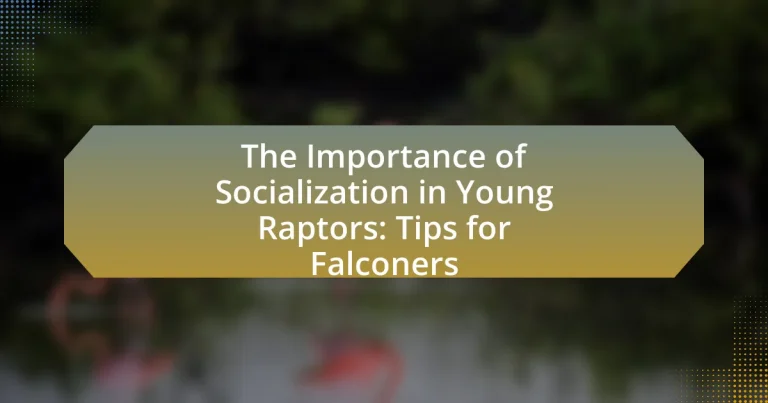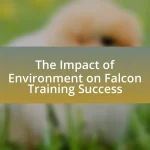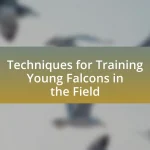The article focuses on the significance of socialization in young raptors and provides practical tips for falconers. It highlights how socialization enhances adaptability, hunting skills, and overall well-being in young raptors, while also addressing the potential consequences of inadequate socialization, such as aggression and fearfulness. Key strategies for effective socialization include consistent handling, positive reinforcement, and exposure to varied environments. The article also discusses the challenges falconers may face during the socialization process and offers best practices to optimize training outcomes for young raptors.
What is the Importance of Socialization in Young Raptors?
Socialization is crucial for young raptors as it enhances their adaptability and hunting skills. Through social interactions, young raptors learn essential behaviors such as recognizing threats, developing social hierarchies, and improving their ability to hunt effectively. Research indicates that raptors raised in social environments exhibit better problem-solving skills and increased confidence, which are vital for their survival in the wild. Additionally, socialization helps in reducing stress and aggression, leading to healthier and more balanced adult birds.
Why is socialization crucial for young raptors?
Socialization is crucial for young raptors because it helps them develop essential hunting skills and social behaviors necessary for survival. Young raptors that engage in socialization learn to interact with their environment and other birds, which enhances their ability to hunt effectively and establish social hierarchies. Research indicates that raptors raised in isolation may exhibit maladaptive behaviors, such as aggression or fearfulness, which can hinder their ability to thrive in the wild. Therefore, socialization plays a vital role in ensuring that young raptors grow into well-adjusted adults capable of successful hunting and social interactions.
What are the potential consequences of inadequate socialization?
Inadequate socialization can lead to behavioral issues in young raptors, such as aggression, fearfulness, and difficulty in training. These consequences arise because insufficient exposure to various stimuli and social interactions can hinder a raptor’s ability to adapt to its environment. Research indicates that raptors lacking proper socialization may struggle with bonding to their handlers and may exhibit stress-related behaviors, which can negatively impact their performance in falconry. For instance, studies have shown that socialized birds are more likely to respond positively to training and exhibit better overall health and well-being.
How does socialization impact a young raptor’s behavior?
Socialization significantly influences a young raptor’s behavior by shaping its interactions with humans and other birds. Through socialization, young raptors learn essential skills such as hunting, foraging, and recognizing social cues, which are critical for their survival and integration into their environment. Research indicates that raptors exposed to varied social settings exhibit reduced stress and improved adaptability, leading to more effective hunting techniques and better overall health. For instance, studies show that young raptors that engage with both their species and humans develop stronger behavioral responses, enhancing their training outcomes and fostering a more cooperative demeanor.
What role does socialization play in a falconer’s training process?
Socialization is crucial in a falconer’s training process as it helps young raptors develop trust and adaptability to human interaction. Through consistent exposure to various environments and people, falconers can ensure that their birds become comfortable and responsive, which is essential for effective training and successful hunting. Studies indicate that socialized raptors exhibit improved performance and reduced stress during training sessions, leading to better outcomes in their development and handling.
How can socialization enhance training outcomes for young raptors?
Socialization enhances training outcomes for young raptors by improving their adaptability and reducing stress during training sessions. When young raptors are exposed to various stimuli, environments, and interactions with other birds and humans, they develop better coping mechanisms and become more confident. This increased confidence leads to improved focus and responsiveness during training exercises. Research indicates that socialized raptors exhibit lower levels of fear and aggression, which facilitates a more effective learning process. For instance, studies have shown that raptors that engage in social interactions are more likely to successfully complete training tasks compared to those that are isolated.
What specific socialization techniques should falconers employ?
Falconers should employ techniques such as consistent handling, positive reinforcement, and exposure to various environments to socialize young raptors effectively. Consistent handling involves regular, gentle interaction with the bird to build trust and familiarity, which is crucial for developing a strong bond. Positive reinforcement, such as offering food rewards for desired behaviors, encourages the raptor to associate human presence with positive experiences. Additionally, exposing young raptors to different environments, sounds, and people helps them adapt to various stimuli, reducing stress and enhancing their ability to thrive in diverse situations. These techniques are supported by studies indicating that early socialization significantly impacts a raptor’s behavior and adaptability in the wild and captivity.
How can Falconers Effectively Socialize Young Raptors?
Falconers can effectively socialize young raptors by exposing them to various environments, people, and stimuli from an early age. This exposure helps the birds become accustomed to different sounds, sights, and interactions, which is crucial for their development and future training. Research indicates that socialization reduces stress and enhances adaptability in raptors, leading to better performance in hunting and handling situations. Regular handling by different individuals also fosters trust and reduces fear, making the raptors more manageable and responsive.
What environments are best for socializing young raptors?
The best environments for socializing young raptors are controlled, spacious outdoor settings that mimic their natural habitat, such as aviaries or large enclosures. These environments allow young raptors to interact with their peers, engage in natural behaviors, and develop essential social skills. Research indicates that socialization in such settings can lead to improved adaptability and reduced stress in raptors, as they learn to navigate social hierarchies and establish bonds with other birds.
How does the choice of environment influence socialization success?
The choice of environment significantly influences socialization success in young raptors. A well-structured environment that mimics natural conditions fosters positive interactions and reduces stress, which is crucial for effective socialization. For instance, environments that provide ample space, varied perches, and opportunities for interaction with other birds enhance the learning experiences of young raptors. Research indicates that raptors raised in enriched environments exhibit better social behaviors and adaptability compared to those in restrictive settings. This is supported by studies showing that exposure to diverse stimuli and social contexts leads to improved behavioral outcomes in avian species.
What are the key factors to consider when selecting a socialization space?
The key factors to consider when selecting a socialization space for young raptors include safety, size, environmental enrichment, and accessibility. Safety is paramount, as the space must be free from hazards that could harm the birds. The size of the area should allow for adequate movement and interaction, promoting healthy social behaviors. Environmental enrichment, such as varied terrain and perches, is essential to stimulate the birds’ natural instincts and encourage exploration. Lastly, accessibility for both the falconer and the birds is crucial to facilitate training and monitoring, ensuring that the socialization process is effective and safe.
What methods can falconers use to socialize young raptors?
Falconers can socialize young raptors through methods such as consistent handling, exposure to various environments, and positive reinforcement training. Consistent handling involves regularly interacting with the birds to build trust and familiarity, which is crucial for their development. Exposure to different environments helps young raptors adapt to various stimuli, reducing fear and promoting confidence. Positive reinforcement training, where rewards are given for desired behaviors, encourages social interaction and strengthens the bond between the falconer and the raptor. These methods are supported by studies indicating that socialization significantly enhances the behavioral adaptability and performance of raptors in both captivity and the wild.
How can positive reinforcement be applied in socialization?
Positive reinforcement can be applied in socialization by rewarding desired behaviors in young raptors, which encourages them to repeat those behaviors. For instance, when a falconer successfully introduces a young raptor to new environments or social interactions, providing treats or praise reinforces the raptor’s positive response to these experiences. Research indicates that animals learn more effectively when they associate specific actions with positive outcomes, as demonstrated in studies on operant conditioning. This method not only enhances the raptor’s social skills but also builds trust between the falconer and the bird, facilitating a stronger bond essential for effective training and socialization.
What role does interaction with other birds play in socialization?
Interaction with other birds is crucial for socialization as it helps young raptors develop essential social skills and behaviors. Through interactions, young raptors learn to communicate, establish hierarchies, and engage in play, which are vital for their survival and integration into their species. Research indicates that social interactions can enhance cognitive development and improve hunting skills, as observed in studies of raptor behavior in natural settings. These interactions also foster bonding and reduce stress, contributing to overall well-being in young birds.
What Challenges Might Falconers Face in Socializing Young Raptors?
Falconers face several challenges in socializing young raptors, primarily due to the birds’ natural instincts and behaviors. Young raptors may exhibit fear or aggression towards humans, making initial interactions difficult. Additionally, the need for consistent and positive exposure to various stimuli, including people and environments, can be time-consuming and requires patience. The developmental stage of the raptor also plays a crucial role; if socialization occurs too late, the bird may become more set in its ways, leading to long-term behavioral issues. Research indicates that early and frequent handling is essential for reducing fear responses, but achieving this can be logistically challenging for falconers who must balance training with the bird’s welfare.
What common obstacles do falconers encounter during socialization?
Falconers commonly encounter obstacles such as fear responses in young raptors, lack of exposure to various stimuli, and inconsistent training methods during socialization. Fear responses can hinder a bird’s ability to interact with humans and other animals, making it crucial for falconers to gradually introduce their birds to new environments. Additionally, young raptors may not have been adequately exposed to different sounds, sights, and experiences, which can lead to anxiety and stress. Inconsistent training methods can confuse the birds, resulting in poor socialization outcomes. These challenges highlight the need for structured and patient approaches to effectively socialize young raptors.
How can falconers overcome fear-based behaviors in young raptors?
Falconers can overcome fear-based behaviors in young raptors by implementing gradual desensitization techniques and positive reinforcement training. Gradual desensitization involves exposing the raptors to various stimuli in a controlled manner, allowing them to acclimate without feeling overwhelmed. Positive reinforcement, such as offering food rewards for calm behavior, encourages the raptors to associate new experiences with positive outcomes. Research indicates that consistent exposure and reward-based training significantly reduce anxiety and fear responses in birds of prey, enhancing their adaptability and performance in falconry settings.
What strategies can be implemented to address aggression in socialization?
To address aggression in socialization among young raptors, falconers can implement strategies such as positive reinforcement training, gradual exposure to social situations, and consistent handling routines. Positive reinforcement training encourages desired behaviors by rewarding calm and non-aggressive actions, which has been shown to reduce aggressive tendencies in birds. Gradual exposure to various social environments helps young raptors acclimate without feeling overwhelmed, thereby minimizing stress-induced aggression. Consistent handling routines establish trust and predictability, which can further decrease aggressive responses. These strategies are supported by behavioral studies indicating that structured socialization practices lead to improved temperament and social skills in raptors.
How can falconers assess the effectiveness of their socialization efforts?
Falconers can assess the effectiveness of their socialization efforts by observing the behavior and responsiveness of the young raptors during training sessions. Specific indicators include the bird’s comfort level around humans, its willingness to engage in training exercises, and its ability to respond to commands. Research indicates that consistent positive interactions and gradual exposure to various stimuli significantly enhance a raptor’s socialization, leading to improved performance and reduced stress in social settings. For instance, studies have shown that raptors that undergo structured socialization programs exhibit lower aggression levels and higher adaptability, confirming the importance of these efforts in developing well-adjusted birds.
What indicators show successful socialization in young raptors?
Successful socialization in young raptors is indicated by their ability to interact positively with humans and other birds. Key indicators include a calm demeanor during handling, willingness to approach and engage with people, and the ability to respond to social cues from both humans and other raptors. Additionally, young raptors that exhibit curiosity and playfulness in their environment demonstrate effective socialization. Research has shown that these behaviors are essential for developing trust and reducing stress, which are critical for their training and future interactions in falconry.
How can falconers adjust their techniques based on assessment outcomes?
Falconers can adjust their techniques based on assessment outcomes by analyzing the behavior and performance of their raptors during training sessions. For instance, if a falconer observes that a young raptor is hesitant to engage with other birds or humans, they may implement gradual socialization exercises to build confidence. Additionally, if assessments reveal that a raptor is not responding well to certain training methods, falconers can modify their approach by incorporating positive reinforcement strategies or varying the training environment. These adjustments are essential for optimizing the raptor’s socialization and overall performance, as evidenced by studies showing that early social experiences significantly influence a bird’s adaptability and behavior in the field.
What are the best practices for socializing young raptors?
The best practices for socializing young raptors include gradual exposure to various environments, consistent handling by different people, and positive reinforcement techniques. Gradual exposure helps young raptors acclimate to new stimuli, reducing stress and fear responses. Consistent handling by various individuals fosters trust and adaptability, essential traits for raptors in training. Positive reinforcement, such as treats or praise, encourages desired behaviors and strengthens the bond between the falconer and the bird. These practices are supported by studies indicating that socialization enhances the overall well-being and performance of raptors in captivity.
How can falconers create a consistent socialization routine?
Falconers can create a consistent socialization routine by establishing a daily schedule that includes regular handling, exposure to various environments, and interaction with different people. This routine should involve specific time slots for training sessions, allowing young raptors to become accustomed to human presence and various stimuli. Research indicates that consistent exposure to diverse settings and social interactions enhances the adaptability and behavior of young raptors, leading to better performance in the field.
What resources are available for falconers seeking to improve socialization techniques?
Falconers seeking to improve socialization techniques can access various resources, including books, online courses, and workshops. Notable books such as “The Falconer’s Apprentice” by A. J. McClure provide insights into training and socialization methods. Online platforms like the North American Falconers Association offer webinars and forums for knowledge exchange among falconers. Additionally, local falconry clubs often host workshops that focus on socialization practices, allowing falconers to learn from experienced practitioners. These resources collectively enhance the understanding and application of effective socialization techniques in young raptors.


